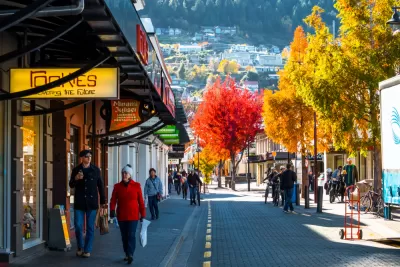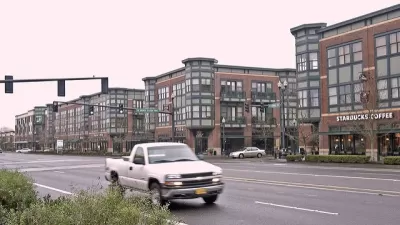The island nation is mandating mid-density zoning requirements and transit-oriented development in an effort to increase housing affordability and encourage compact development.

Responding to the rise in housing costs that has affected even remote corners of the world, New Zealand recently passed "sweeping zoning reform legislation" that encourages mid-density housing development. As Ryan Greenaway-McGrevy writes, these reforms provide some valuable lessons for other countries.
For decades, New Zealand's housing policy essentially omitted middle-density, multi-unit housing types like rowhouses or mid-rise apartment buildings, favoring single-family homes and high-rise apartment buildings in limited urban areas. But now, with significant population growth raising demand for the country's limited housing, lawmakers from across the political spectrum are seeking ways to slow the growth of housing costs. In addition to the new Medium Density Residential Standard, policies include "a capital gains tax targeted at housing speculation, a ban on foreign investment in residential housing, fast-tracked inclusive housing developments, and state-subsidized housing development projects." In 2020, as part of its National Policy Statement on Urban Development, the government mandated higher-density development near transit lines.
Kiwis saw success with upzoning policies in Auckland, where the city's Auckland Unitary Plan (AUP) led to a sharp increase in permits for attached housing and more development in the city's inner suburbs. But although New Zealand's policy experiments show promising results in stimulating construction, it remains to be seen whether increased affordability will follow suit, and how long it will take for supply to meet demand.
FULL STORY: New Zealand’s bipartisan housing reforms offer a model to other countries

Maui's Vacation Rental Debate Turns Ugly
Verbal attacks, misinformation campaigns and fistfights plague a high-stakes debate to convert thousands of vacation rentals into long-term housing.

Planetizen Federal Action Tracker
A weekly monitor of how Trump’s orders and actions are impacting planners and planning in America.

Chicago’s Ghost Rails
Just beneath the surface of the modern city lie the remnants of its expansive early 20th-century streetcar system.

Bend, Oregon Zoning Reforms Prioritize Small-Scale Housing
The city altered its zoning code to allow multi-family housing and eliminated parking mandates citywide.

Amtrak Cutting Jobs, Funding to High-Speed Rail
The agency plans to cut 10 percent of its workforce and has confirmed it will not fund new high-speed rail projects.

LA Denies Basic Services to Unhoused Residents
The city has repeatedly failed to respond to requests for trash pickup at encampment sites, and eliminated a program that provided mobile showers and toilets.
Urban Design for Planners 1: Software Tools
This six-course series explores essential urban design concepts using open source software and equips planners with the tools they need to participate fully in the urban design process.
Planning for Universal Design
Learn the tools for implementing Universal Design in planning regulations.
planning NEXT
Appalachian Highlands Housing Partners
Mpact (founded as Rail~Volution)
City of Camden Redevelopment Agency
City of Astoria
City of Portland
City of Laramie





























